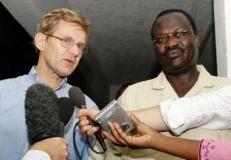UN to join Uganda truce monitoring team
Nov 14, 2006 (KAMPALA) — The United Nations will join a team monitoring a landmark truce between Uganda and the rebel Lord’s Resistance Army hoped to help end northern Uganda’s brutal, two-decade war, a top UN envoy has said.
 UN humanitarian chief Jan Egeland said the world body would deploy observers and helicopters to reinforce the team now overseeing the truce, signed in August and renewed this month despite allegations of violations on both sides.
UN humanitarian chief Jan Egeland said the world body would deploy observers and helicopters to reinforce the team now overseeing the truce, signed in August and renewed this month despite allegations of violations on both sides.
Two days after a historic but inconclusive meeting with elusive LRA supremo Joseph Kony, Egeland said UN staff and choppers would participate in monitoring the truce and two neutral camps where rebels are to gather in south Sudan.
“We shall join the monitoring team to go to the assembly areas and to talk to the communities near these areas as a way to find out more about the LRA fears that they are still being pursued by the Ugandan army,” he told AFP.
“There are still mutual accusations from each side so the monitoring of the assembly areas will try to answer this,” Egeland said, without giving a timeframe for the start of UN participation.
The truce called for a monitoring team made up of officials from southern Sudan, the African Union, the Ugandan government and the LRA but had not until now involved the United Nations, which has a large mission in south Sudan.
Numerous relief groups had complained that the international community was not doing enough to support the talks and Egeland’s weekend trip to the talks venue in southern Sudan and meeting with Kony were aimed at easing that concern.
Soon after the truce was signed, the LRA accused Uganda of massing troops around the sites in preparation for attack. Rebel fighters who had assembled then left, prompting Kampala to accuse the LRA of regrouping for war.
When the truce was extended on November 1, the Ugandan military agreed to pull back from the vicinity of the camps but the rebels are refusing to return until the withdrawals are formally confirmed.
“Redeployment (of the army) is a genuine problem for the LRA to assemble,” Egeland said, adding that Ugandan President Yoweri Museveni had given him a personal assurance it would be done.
“President Museveni assured me that the Ugandan government has agreed to make some redeployments in order to facilitate the LRA’s assembling,” he told reporters in Kampala earlier.
The conflict in northern Uganda has claimed tens of thousands of lives and displaced nearly two million people, and is regularly described as one of the world’s worst, and most-forgotten, humanitarian crises by Egeland and others.
Peace talks in Juba, the capital of southern Sudan, whose semi-autonomous government is mediating, began in July and were given a major boost by the truce a month later.
But since then, the negotiations have stalled apart from the truce renewal, with the two sides bickering over alleged violations as well as war crimes charges and power-sharing and governance issues.
Despite the difficulties, the Juba talks are seen by many as the best chance to end the 19-year conflict and Egeland said he hoped the two sides would shortly agree to resume negotiations in earnest after his visit.
“There is a commitment on both sides,” he said. “They all want to bring this problem to an end although they continue to accuse each other of being dishonest.”
The conflict has raged since 1988, when Kony and the LRA took leadership of a regional rebellion among northern Uganda’s ethnic Acholi minority.
(AFP)
